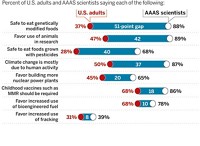Advertisement
Grab your lab coat. Let's get started
Welcome!
Welcome!
Create an account below to get 6 C&EN articles per month, receive newsletters and more - all free.
It seems this is your first time logging in online. Please enter the following information to continue.
As an ACS member you automatically get access to this site. All we need is few more details to create your reading experience.
Not you? Sign in with a different account.
Not you? Sign in with a different account.
ERROR 1
ERROR 1
ERROR 2
ERROR 2
ERROR 2
ERROR 2
ERROR 2
Password and Confirm password must match.
If you have an ACS member number, please enter it here so we can link this account to your membership. (optional)
ERROR 2
ACS values your privacy. By submitting your information, you are gaining access to C&EN and subscribing to our weekly newsletter. We use the information you provide to make your reading experience better, and we will never sell your data to third party members.
Policy
Carol Henry
Former executive pushes for collaboration and standard scientific practices to improve credibility of industry-funded research
by Britt E. Erickson
August 25, 2008
| A version of this story appeared in
Volume 86, Issue 34
IN A WORLD of diminishing resources and increasingly complex environmental and human health issues, judging science as good or bad solely on the basis of funding sources does not serve public health. That was the message driven home by Carol J. Henry, a private consultant and former vice president for industry performance programs at the American Chemistry Council (ACC), at a recent meeting on scientific integrity sponsored by the Center for Science in the Public Interest (CSPI).
Saying she felt like an endangered species among a group of mostly nonindustry scientists and policymakers, Henry presented herself as a hybrid—someone who has worked in both the government and industry. Although she doesn't consider herself ever having been an academic, she holds a Ph.D. in microbiology and has had several postdoctoral positions as well as some teaching experience.
C&EN caught up with Henry after the CSPI meeting to find out how she's been spending her time since she retired from ACC last November and to learn more about what can be done to improve the credibility of industry-funded research. A longtime advocate of research standards, Henry has chosen to spend her first year of retirement advising, consulting, and doing public service work.
She is currently the president-elect of the Chemical Society of Washington, the District of Columbia local section of the American Chemical Society, and she sits on a federal advisory committee that is reviewing the National Children's Study, an interagency effort to examine environmental influences on the health and development of more than 100,000 U.S. children from before birth until age 21. Somehow she manages to do all of that in between trips to see her two daughters and grandson.
"Visiting our children has been a particularly enjoyable pastime because they have been located in interesting places. Our youngest daughter, in particular, is a marine biologist, who has worked in the Cayman Islands and is now in Hawaii," Henry says.
When she's not snorkeling, kayaking, sailing, or hiking with her family, or tending to her garden at her home in the suburbs of Washington, D.C., Henry can be found collaborating with people who are among the least likely to work with industry, including environmental activists, to develop common approaches for environmental and public health research. Her goal is to have all science judged by the same criteria so that good research will be deemed credible, regardless of who funded it.
"Industry-funded research has been part of the U.S. scientific enterprise for over 50 years," Henry emphasizes. "In 2006, U.S. R&D expenditures were $343 billion, with only $97 billion from the federal sector, $223 billion from the private sector, and $22 billion from a category called other," which comprises universities, colleges, and not-for-profit organizations, she says. This last category didn't exist 30 years ago, when total R&D spending was about $110 billion and the split was more 50-50 between federal and private funding, she adds.
One of the people Henry is collaborating with is David Michaels, professor of environmental and occupational health at George Washington University School of Public Health & Health Services and author of the recent book "Doubt is Their Product: How Industry's Assault on Science Threatens Your Health." In his book, Michaels brings to light numerous product defense groups whose strategies mirror those of big tobacco public relations firms, trying to create uncertainty in the science surrounding public health issues for the sake of delaying regulation.
"David Michaels and I are working together to see how we can drive our respective organizations and contacts together to try to formulate something constructive. I think everyone is moving toward some kind of common approach," Henry says. The key to that approach is the development of transparent research standards and practices that can be used by all scientists, she notes.
OVER THE YEARS, Henry has managed various research programs for the California Environmental Protection Agency, the U.S. Department of Energy, the American Petroleum Institute, and ACC. In those programs, she used a common set of standards for doing research, which she is now encouraging all scientists to adopt. She recommends that data be owned by the scientist, not the sponsor; results be released and published without prior sponsor approval; inappropriate sponsor interference be eliminated; open access to data for industry and other sponsored research be required as it is required for federally sponsored research; funding sources be disclosed; and conflict-of-interest and bias policies be established.
"I think the scientific community agrees with these standards, but I don't think that the community has come together to say we need to do these things universally," Henry says. She does not advocate requiring such standards through formal regulations, however, and that is where she says she and Michaels differ.
Regardless of whether regulations are needed to convince scientists to adopt such standard practices, what is clear is that the divide between federally funded work and industry-funded work is growing. "From my perspective we are in a crisis mode," Henry says. "If the scientific community does not take its science back and declare ownership of due process, appropriate peer review, and publication criteria, then the role of science in regulatory decision-making will surely be irreparably harmed. Science has been taken hostage by advocates and lobbyists on all sides. It is time for scientists to take the science back."





Join the conversation
Contact the reporter
Submit a Letter to the Editor for publication
Engage with us on Twitter